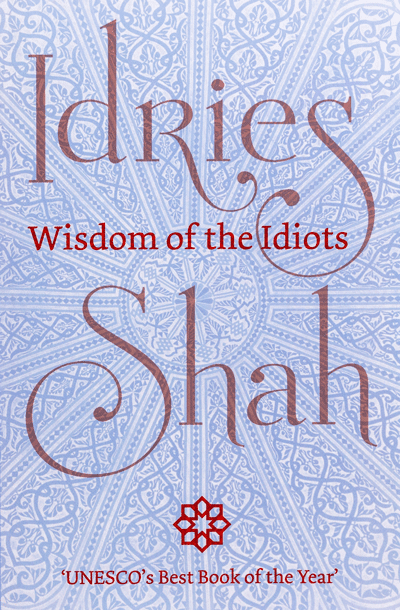Because what narrow thinkers imagine to be ‘wisdom’ is often seen by the Sufis to be folly compared with deeper knowledge, the Sufis sometimes refer to themselves as ‘the Idiots’.
Wisdom of the Idiots is a collection of lively and intriguing stories, narratives, and anecdotes, which illustrate the experiential philosophy used in Sufi teaching.
These ancient fables from the Middle East and Central Asia, many going back several hundred years, exemplify the non-linear and intuitive thinking styles of the masters of Sufism. This type of wisdom, which transcends the limits of conventional logic, is also equated with ‘idiots’ because it penetrates to a depth that is inaccessible to the merely intelligent or academically knowledgeable.
Shah’s stories contain several levels of meaning and work like psychological mirrors in which readers may see themselves and Reality reflected, and come to understand these better.
Wisdom of the Idiots was awarded many prizes, including two gold medals, one for ‘Best Book’ in conjunction with UNESCO’s World Book Year.
‘A stimulation of that part of the mind which is still unpolluted.’
Kent Evening Post
‘The book is full of humour, too, not belly laughs but slow, inner smiles.’
Sunderland Echo
‘A stunningly lucid interpretation for the Western reader of profound and ancient Eastern thinking.’
Oldham Evening Chronicle
‘Hilarious… whisking away the rug from under our favourite convictions and thinking habits... the effect is exhilarating.’
Tribune
The Fruit of Heaven
Haughty and Generous
The Casket of Jewels
Ahrar and the Wealthy Couple
Bahaudin and the Wanderer
Food and Pens
The Glance of Power
Nothing for Man Except What He Has Earned
Milk and Buttermilk
Talisman
Dispute with Academics
Story of Hiravi
Something to Learn from Miri
The Mad King’s Idol
Two Sides
Welcomes
Ajmal Hussein and the Scholars
Timur and Hafiz
Full Up
Charkhi and His Uncle
The Prisoner of Samarkand
The Book in Turki
Beggars and Workers
Unaltered
Diagnosis
The Kashkul
The Cow
Individuality and Quality
Paradise of Song
The Treasure of the Custodians
The Attachment Called Grace
Correction
The Saint and the Sinner
The Sheikhs of the Skullcaps
The Secret of the Locked Room
The Miracle of the Royal Dervish
Ishan Wali’s Test
Hidden Miracles
Entry into a Sufi Circle
A Story of Ibn Halim
The Woman Sufi and the Queen
The Cook’s Assistant
Why Is Wet Not Dry?
Books
When a Man Meets Himself
The Sufi and the Tale of Halaku
Fish on the Moon
Kilidi and the Gold Pieces
Wheat and Barley
The Wine Flask
Said Bahaudin Naqshband
The Sponge of Troubles
The Crystal Fish
The Seal Bearer
Full
Voice in the Night
Perception
Scraps
The Golden Fly
Tavern Pledge
The Knife
Caravanserai
Fantasies
Irrelevance
Fidelity
The Sanctuary of John the Baptist
The Meaning
The Method
Abu Tahir
Containment
Sifting
The Perfect Master
Give and Take
The Fox’s Proof
Opportunity
The Loan
Light-Weaving
Explanation
Day and Night
Source of Being
Stained
Wahab Imri
The Rogue and the Dervish
Hope
Wanting
The Archer
Mahmud and the Dervish
Stages
What Is in It
Sound and Unsound
Lamb Stew
Finding Fault
Hearing
The Baby Elephant
Idries Shah was born in India in 1924 into an aristocratic Afghan family. He was an author and teacher in the Sufi tradition and is considered one of the leading thinkers of the 20th century.
Shah devoted his life to collecting, translating and adapting key works of Sufi classical literature for the needs of the West. Called by some 'practical philosophy' - these works represent centuries of Sufi and Islamic thought aimed at developing human potential. His best-known works include the seminal book The Sufis, several collections of teaching stories featuring the ‘wise fool’ Nasrudin, Reflections and Knowing How to Know.
Shah's corpus - over three dozen books on topics ranging from psychology and spirituality to travelogues and cultural studies - have been translated into two dozen languages and have sold millions of copies around the world. They are regarded as an important bridge between the cultures of East and West.
